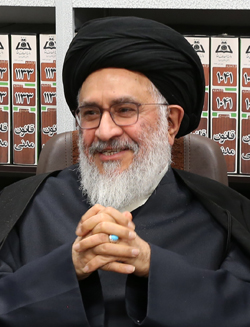
Your complimentary articles
You’ve read one of your four complimentary articles for this month.
You can read four articles free per month. To have complete access to the thousands of philosophy articles on this site, please
Non-Western Philosophy
Mostafa Mohaghegh Damad
Mostafa Mohaghegh Damad interviewed by AmirAli Maleki
Mostafa Mohaghegh Damad, lawyer and theologian, is well-known in Iran for bringing religion closer to the people, AmirAli Maleki asks him about Islam and philosophy.
What is Islamic philosophy?
What is called Islamic philosophy today is a science whose basic principles undoubtedly entered Islamic civilization from the ancient Greeks in the second century of Hijri (750 CE+). And like a living cell in the face of nutrients: the Muslims neither simply rejected nor absorbed it, rather, they digested it – which means that they presented or incorporated the imported materials with the principles and teachings of the Qur’an and the Sunnah [the official interpretation of Islamic practices and traditions]. Then they put ‘wisdom’ (‘ Hekmat’) on it.
What does ‘Hekmat’ mean?
The word ‘wisdom’ – Hekmat – appears sixteen times in the Qur’an, and in several verses it clearly states that wisdom was taught by God to certain people directly, and through them to the wider public.
So what is the duty of wisdom?

Mostafa Mohaghegh Damad
Photo © Shiasun 2017 Creative Commons 4
Islamic wisdom is another title for divine wisdom, since it explains the world based on the existence of God. But this should not cause it to be confused with the knowledge of theology. Theology is never responsible for explaining the world, only for explaining God. The world is explained by the philosophy, not by the theology.
Have the teachings of the Qur’an been useful to Islamic philosophers?
Muslim sages interpreted the Qur’anic teaching through philosophical foundations in very original ways. For example, Ibn Sina’s interpretation of verse 35 of Surah Noor in his book Alisharat waaltanbihat shows the mutual influence of the teachings of the Qur’an and of [Aristotelian] rationalist standards in the formation of Islamic wisdom.
Is cultural exchange with other nations also seen in the works of Islamic philosophers?
Historians are of the opinion that the main source of culture, science, and civilization for the West is ancient Greece. But the ancient nations of the Middle East, such as Egypt, Syria, Chaldea, Iran, and India, also played an effective role in the cultural exchange. Many branches of Greek sciences – such as mathematics, philosophy, medicine, and astronomy – after being transferred first to the Eastern countries and translated, were then transferred from the Middle East during the European Renaissance to the farthest parts of the West. For this reason it is not surprising that in the Middle Ages the works of famous Muslim scholars – who were mostly Iranian, such as Ibn Sina and Al Farabi – were taught in prestigious European universities. So, in many artistic and philosophical fields, the owners of thought and art in the West were inspired by Islamic sources.
What effect did Muslim thinkers have on Europe?
According to Pirroso in his book The History of Sciences, Muslim Spain had acquired extraordinary brilliance in the ninth and tenth centuries AD, and the Spanish cities of Cordoba, Tallitle, and Seville had become great centres of learning. French, German, English, Czech and Italian youths flocked to them. These universities displayed riches that those young people had never imagined! Among the treasures were the ideas of Aristotle, Socrates, Ptolemy, and others. What’s more, Arabs and Spaniards, Muslims, Christians, and Jews, sat next to each other on the chairs of these universities. And when they returned to their countries, they relayed the useful things they had learned.
Have Islamic philosophers made an impact on Western philosophy?
It’s interesting that according to the testimony even of Western philosophy professors, many documents can be found that show the influence of Al Farabi’s and Ibn Sina’s philosophy on Western philosophy, among other Islamic thinkers. Although traces of them can be found in Socrates [that is, in Plato’s Socratic dialogues], the subjects of the care of the soul, the relationship between the soul and the body, and the end of the soul after separation from the body, are definitely among the innovations of the Muslim sages; for instance, Ibn Sina arranged them in the seventh and eighth chapters of Alisharat wa altanbihat (Remarks and Admonitions: Physics and Metaphysics). And the separation of essence from existence – which is one of Ibn Sina’s innovations – is the basis of many ideas in both Eastern and Western philosophies.
Does Islamic philosophy have a middle ground with secularism?
According to what I said in terms of Islamic wisdom explaining the world based on the existence of God, this knowledge can never be reconciled with secularism, if secularism means the absence of God. However, more precisely speaking, secularism means the separation of religion from politics. One can then put one’s foot down and consider politics as a part of practical and intellectual wisdom, and so approachable through Islamic thinking, even cooperating with it.
• AmirAli Maleki is a philosophy researcher and the Editor of PraxisPublication.com. He works in the fields of political philosophy, Islamic philosophy, and hermeneutics.









